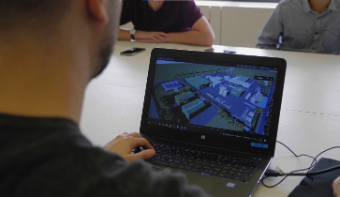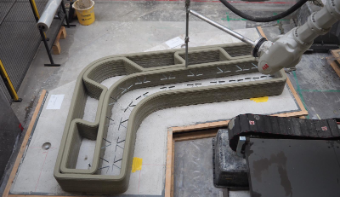Crack Width Analysis App

Crack Width Analysis App
Many civil engineering structures in the Netherlands were built shortly after the Second World War and are approaching the end of their lifespan. As well as this, the increase in traffic means they are faced with increasingly heavier loads. It is important to check whether cracks have formed in concrete structures and to monitor whether they could possibly increase in size over time. These inspections are currently done in a way that could be much improved in terms of speed, reliability and objectivity. The Crack Width Analysis App helps to achieve this.
The problem: unreliable measurements
Between the different measurements of cracks in concrete or stone taken by inspectors, quite a difference can exist. This is because measurements are still being made with a plastic card featuring lines of various thicknesses. These need to be read by eye.
Not only that, a crack is also only measured in one place. By taking the measurements with a smartphone – i.e. taking a picture and analysing it with an app – the results become uniform, reliable and objective.

A trained algorithm and augmented reality
Anybody who has ever had to deal with damage for which multiple measurements are taken is familiar with the problem of varying results for a single crack. As the person in charge of a structure, you do not want to be faced with such uncertainty.
Thanks to a trained algorithm and augmented reality, the Crack Width Analysis App is able to support an inspector on-site in making the right measurements. The result is an extremely low error rate which could never be achieved by taking measurements manually.

Four simple steps to an advanced result
- Photo capture
The inspector logs in and points the smartphone’s camera at the crack. The app is available in the Apple App Store; contact us for use with other operating systems. - Photo optimisation
The app calculates its position in relation to the crack and indicates whether a reliable measurement can be made. The app asks which damage has to be analysed. The inspector can import that information. - Crack analysis
In the background, a calculation is performed which allows an accurate analysis to be made. The photos and data are stored in the cloud. - Results display
The app provides a summary of the calculations’ results and an advanced visual read-out.

Linked to your asset management system
If you use the app, you want to integrate it into your current systems. All the app’s data is stored in the cloud and can be accessed anytime, anywhere. The dashboard gives you a complete, detailed, but also comprehensible picture. Seamless integration with your asset management system is also ensured. The software is designed according to ISO standards. Want to know more about the Crack Width Analysis App? Visit the website here (Dutch).
For the development of the Crack Width Analysis App, Witteveen+Bos collaborated with IT specialist Innovadis. The Province of Overijssel acted as the launching customer.

Why the Crack Width Analysis App?

Innovative
Thanks to a trained algorithm and augmented reality, there is an extremely low error rate which could never be achieved by taking measurements manually.

Data availability
The data is stored in the cloud and can be accessed anytime, anywhere.

Reliability
The measurements made with the app are extremely reliable, because a crack can be measured in more than one place.
Want to know more?
Marijn generates impact through innovation such as digitalisation and 3D concrete printing in the construction industry. He was the winner of the 2020 Cobouw Young Talent Award.



